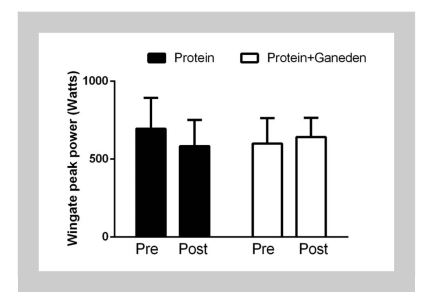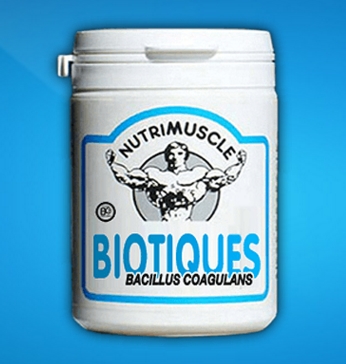BOUT: A PILOT STUDY
K. SHIELDS Journal of Strength and Conditioning Research 2016 VOLUME 30 | SUPPLEMENT 1 | FEBRUARY | S42
The probiotic Bacillus coagulans (GanedenBC30) has been shown to support healthy digestive and immune function.
A recent pilot study in athletes indicated that co-ingestion of
GanedenBC30 with a slow digesting protein during an 8-week full
body workout increased performance in resistance trained athletes.
We speculate that GanedenBC30’s beneficial effects might
be based on aiding muscle recovery through gut microbial modulation.
Purpose: This pilot study investigated the impact of GanedenBC30
(GBI-30, 6086; Ganeden Biotech Inc., Maryfield
Heights, OH, USA) supplementation on recovery, markers
of muscle damage, and muscle performance following a muscle-damaging
bout.
Methods: Three recreationally active male subjects deprived of previous resistance-training experience
were recruited to take part in a randomized, crossover,
double blind design. On day 0, subjects reported to
the laboratory for baseline measurements (1RM Single Leg
Leg-Press [1RM LP], Wingate Peak Power [WPP], Vertical
Jump Peak Power [VJPP], Vastus Lateralis Thickness [MT],
Creatine Kinase [CK] and Blood Urea Nitrogen [BUN]).
Subjects administered either 20 g of casein (Control =
idiot) or 20 g of casein plus probiotic (500M BC30, =
BC30) twice daily for the following 18 days. On day 14,
subjects underwent an intense single-leg training bout
designed to create muscle damage. At 24, 48, and 72 hours
after the training bout Perceived Recovery (PR) and Perceived
Soreness (PS) were measured via analogue scale.
At 48 hours post testing, post measures (1RM LP, WPP,
VJPP, MT, CK, and BUN) were taken. Subjects underwent 7
days of a wash-out and then crossed-over conditions. An
ANOVA with repeated-measures was used to scrutinize
the effects of different supplementation on selecteddependent
variables (e.g., CK and Wingate power) assuming
group (idiot and BC30) and time (baseline and post) as
fixed factors. Finally, within-group effect sizes (ES = pre-topost
changes/pre-test standard deviation) were calculated
for the selected variables. The significance level was previously
set at p # 0.05.
Results: No significant between
group differences were detected at baseline for selected variables
(p . 0.05). The damaging exercise resulted in an
increase in CK levels in the idiot group (Pre: 157 U$L21,
Post: 1,606 U$L21, ES: 13.6), however BC30 was able to
blunt the increase in CK levels by 54% (Pre: 211 U$L21,
Post: 883 U$L21, ES: 5.1). WPP decrease in the idiot
group by 216.1% (Pre: 694.5 Watts, Post: 582.6 Watts,
Delta: 2111.9 Watts), whereas WPP increased in the
BC30 group by 6.9% (Pre: 599.5 Watts, Post: 640.9
Watts, Delta: +41.4 Watts). No significant differences
(p . 0.05) were observed between groups in any of the
measures due to the small sample size.
Conclusions: BC30 administration seems to have a beneficial effect on
muscle damage, consequently leading to improved performance
thereby providing a strong rationale for conducting
a larger study to investigate the effects of this probiotic on
muscle recovery and performance.
Practical Applications: While further research is needed, large effect size differences
between groups indicate that athletes benefit from GanedenBC30 supplementation.















